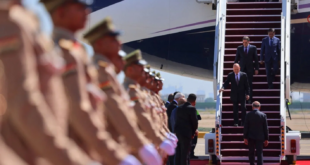U.S. and Greek officials plan to launch a wave of investments in a bid to designed to stymie China’s bid for economic clout and political influence in Southern Europe.
“The sky’s the limit regarding what we can achieve together,” Greek Prime Minister Kyriakos Mitsotakis said after a meeting with Secretary of State Mike Pompeo.
That ebullience is a welcome sight for China hawks in Washington, who have come in recent years to regard Beijing’s purchase of the port of Piraeus as a strategic threat. Pompeo, who emphasized on Tuesday that the communist power seeks “to use economic power here and in the region to gain strategic leverage over European democracies,” made his second trip to the Aegean nation in the last year in part to finalize a deal that identifies a relationship between Greek economic resilience and security.
“The upgraded Mutual Defense Cooperation Agreement between Greece and the U.S. is expanding its actions and activities … and U.S. investments in Greek shipyards,” Mitsotakis said.
That statement marks an important shift from 2016, when Greece sold a controlling stake in Piraeus to China, after Western countries showed a lack of interest in the ancient Athenian port. Two years later, Greece signed up for China’s Belt and Road Initiative, an overseas infrastructure investment program that Pompeo regards as a Chinese Communist Party scheme to buy an “empire,” as Chinese General Secretary Xi Jinping told Greece that Beijing could make Piraeus into Europe’s largest port.
“We want to strengthen Piraeus’s transshipment role and further boost the throughput capacity of China’s fast sea-land link with Europe,” Xi said in 2019.
That statement made explicit the significance of China’s growing list of railway deals in the Balkan countries north of Greece. “So, this port is not only a Greek project anymore; this is something that could potentially go from Piraeus to Bucharest,” said Hellenic American Leadership Council Executive Director Endy Zemenides, referring to the capital of neighboring NATO ally Romania.
And with that economic clout comes the potential that Beijing would have the power to influence the political decisions of U.S. allies. Such influence could have far-reaching significance because allied organizations such as NATO and the European Union require unanimity to act — raising the specter of a crisis in which Beijing cripples transatlantic diplomacy by forcing its economic clients to veto policies that would benefit American interests.
“Originally, they were worried about the Western Balkans just from a U.S.-Russia standpoint,” Zemenides added. “I think right now, they see there’s a China angle.”
Mitsotakis observed that Thessaloniki, where Pompeo met Monday with business leaders, “has been and will always be a dynamic springboard” for the region. “Our peninsula is a geographic area where a lot of U.S. and Greek interests converge,” he emphasized.
 Eurasia Press & News
Eurasia Press & News



